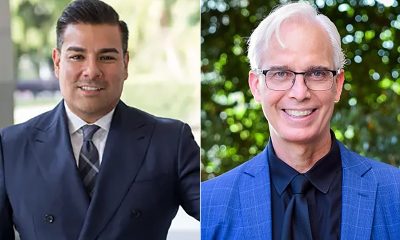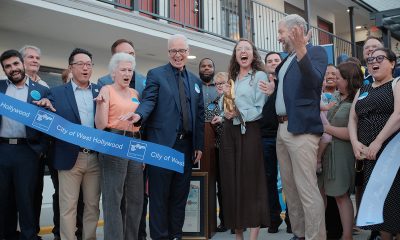Local
Breaking: California Democratic Party Chair Eric Bauman resigns
Despite midterm victory, internal firing squad aims at gay political operative
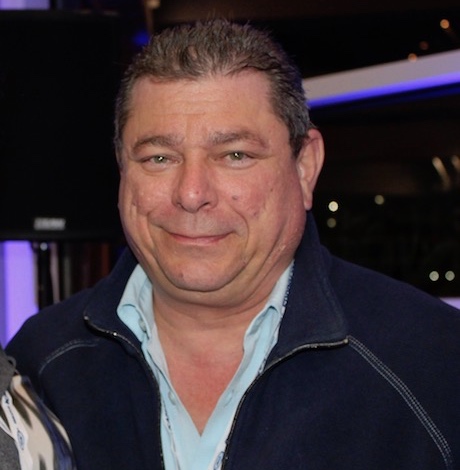
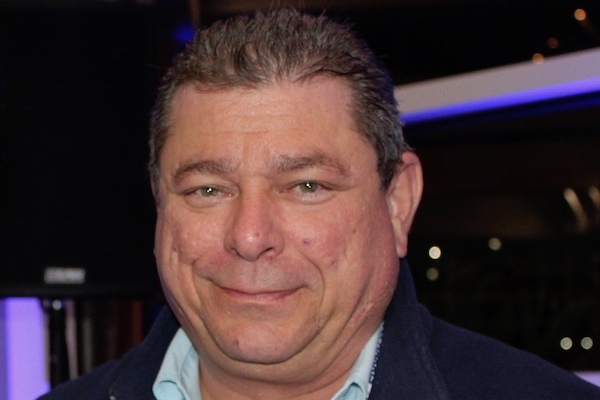
Eric Bauman at the California Democratic Party Convention Feb. 2018. (Photo by Karen Ocamb)
Breaking: Eric Bauman, the first openly LGBT Chair of the California Democratic Party, announced his resignation Thursday following a story in the Los Angeles Times in which 10 staffers and political activists allege sexual harassment and misconduct by the longtime Democratic activist.
“I have made the realization that in order for those to whom I may have caused pain and who need to heal, for my own health, and in the best interest of the Party that I love and to which I have dedicated myself for more than 25 years, it is in everyone’s best interest for me to resign my position as chair of the California Democratic Party,” Bauman said in a statement to The Times after Gov.-elect Gavin Newsom, state Senate President Pro Tem Toni Atkins, Controller Betty Yee and others, including Equality California Executive Director Rick Zbur, called on him to step down.
The Times did not indicate whether the investigation would continue or now be halted or what process might occur to replace Bauman.
The following is the cover story for the Los Angeles Blade filed Thursday morning before Bauman’s announcement:
In addition to the historic flipping of rock red Republican congressional seats and electing California’s first openly gay statewide official, Democrats virtually decimated the state GOP during the midterm elections. “It’s been decades since California Democrats had this much power at the Capitol,” blared a Nov. 26 Sacramento Bee headline.
Democrats, The Bee wrote, “are on pace to control three-fourths of the Assembly — 60 out of 80 seats — a feat has not been accomplished in 135 years, in 1883. In the Senate, Democrats are likely to grab 29 seats out of 40, which would be the party’s largest advantage since 1962 (except for a brief period in 2012).”
But Democrats seem to have a penchant for complicating victories, forming a circular firing squad to kill off or maim someone perceived to have too much power. A rump group of House rebels—considered by some to be the Democratic equivalent of the Republican Freedom Caucus—is challenging establishment Leader Nancy Pelosi in her historic campaign to re-take the gavel as Speaker next year, despite Pelosi’s winning midterm messaging.
And in California, a handful of Democratic Party staffers and associates—some of whom were aligned with Kimberly Ellis, Bauman’s 2017 Berniecratic opponent for party chair—have alleged sexual harassment and sexual assault charges against Bauman, forcing him to take a leave of absence while Debra Henshaw Vierra from the outside law firm of Churchwell White investigates the allegations.
But given the publicity, the rush to judgment and societal interpretations of gay male gestures and flirtations by today’s #MeToo standards, it is very possible that no matter what the determination of the official investigation, Bauman—one of the key architects of the California midterm success—may not be able to shake the scarlet letter of misconduct.
So what happened? Is Bauman the political Kevin Spacey or California’s Al Franken or an old-fashion gay guy who talks sincerely about sexual harassment but hasn’t applied it to his own gay culture flirtations?
The story that may bring down a “kingmaker” burst into the open the weekend of Nov. 23-25 during the CDP Executive Board meeting. But it originated before the Nov. 6 elections, according to news accounts. Bauman was leading a statewide get-out-the-vote bus tour when “two young women on the bus reported alcohol was consumed and inappropriate sex talk occurred on Nov. 1,” out David Campos, chair of the San Francisco Democratic Party, told the Associated Press.
They were headed for a Nov. 2 event in San Francisco with Leader Pelosi but when “her campaign team and Campos learned of the incidents aboard the bus,” they told state party officials “that Bauman and the bus should stay away,” Campos told AP. The wire service added that “it appeared Bauman engaged in the misbehavior and did not intervene to stop others from acting inappropriately,” citing Campos as the source.
“We felt, and I felt, it was important for us, given we had serious credible allegations, not to have Chair Bauman attend this get-out-the-vote event in San Francisco,” said Campos, who first revealed the details to the Bay Area Reporter.
On Nov. 28, the Los Angeles Times published interviews with the two young women. Grace Leekley, 21, identified as a temporary worker in the party’s communications department, who said she did not want to ride on the bus because of Bauman. But she met up with the tour Nov. 1 in Chico and joined the staff for lunch. She sat next to Kate Earley, 21, identified as having started about six weeks earlier as the party’s digital director.
“Leekley and Earley said that during the lunch, Bauman shushed the staffers at the table and then asked the women, within earshot of their colleagues, if the two were having an affair. When both women said no, Bauman pressed the issue, they said, telling them he would not mind if they were involved in a sexual relationship so long as it did not affect the workplace,” The Times reported.
Described another way—Bauman teasingly asked the two young women if they were a couple—it was OK if they were, just not at work. And herein lies a problem: Bauman may have thought he was warmly joking around but it was apparently perceived by the two new young staffers as sexual harassment and they felt intimidated.
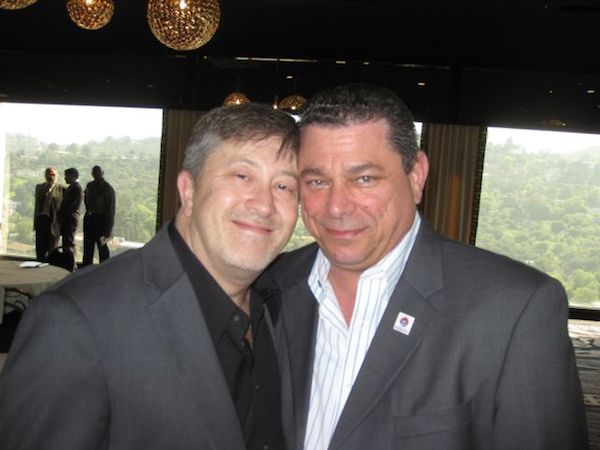
CDP Chair Eric Bauman with Michael Andraychak, his husband of more than 30 years. (Photo by Karen Ocamb)
“I felt really embarrassed, almost ashamed, and uncomfortable,” Leekley told The Times. “I’m basically bottom-of-the-barrel staff — and he’s the most powerful man in the party. I didn’t feel comfortable saying anything.”
“A party staffer told The Times that he heard Bauman make the comments and said the two women told him afterward they felt deeply uncomfortable. Earley filed a complaint to her supervisor within 30 minutes of the incident and spoke with the human resources department later that day, she said. Her attorney said the complaint remains unresolved,” The Times reported Nov. 28. “As of the time he took a leave of absence on Monday, Bauman had not seen a formal complaint, according to a source close to the chairman.” As of Nov. 29, CDP spokeperson Mike Roth has not replied to inquires from the Los Angeles Blade about if and when any complaints have been officially filed and by whom.
It is not yet known what Earley’s supervisor or the human resources department did with her complaint. But here’s where things get murky.
The bus tour incident occurred on Nov. 1 but apparently nothing more was said or done until Nov. 23, the Black Friday after Thanksgiving, when party Vice-Chair Daraka Larimore-Hall suddenly circulated a “Statement of Charges” to members via email and on social media alleging sexual harassment and sexual assault and a call for Bauman to resign. But he apparently did not confront Bauman directly during the Executive Board meeting.
“This past weekend, I learned of multiple serious and credible allegations that Chairman Bauman sexually harassed, and in some cases sexually assaulted, individuals during party functions, and of at least one incident of Chairman Bauman tampering with witnesses. I have spoken directly with two victims, who confirm the allegations, and I spoke to the potential witness whom Chairman Bauman intimidated. I understand there are additional victims as well,” Larimore-Hall wrote. “ I believe the victims. Their stories illustrate a clear and escalating pattern of Chairman Bauman’s horrific and dehumanizing behavior.”
Larimore-Hall is not specific about the charges, doesn’t identify the victims and asks for respect for the victims’ privacy rights. In a second letter, he explains that he was approached “by a number of Party staff who confided in me their stories of sexual harassment and assault” by Bauman. He calls them “survivors,” and “young political professionals, many of whom are at the very beginning of their careers.” Obviously, he says, “it is completely unacceptable for Chairman Bauman to remain in office given these credible, corroborated and utterly heart-breaking allegations.”
The first note sounds like Leekley and Earley and the party staffer who overheard Bauman talk to the young women at lunch. But when and how did the two turn into a “number of Party Staff” who came forward to share their experiences? This is before Rep. Ro Khanna (D-San Jose) broke the allegations wide open with a tweet on Friday, Nov. 23.
“The allegations of sexual assault that @DarakaKenric is filing against @EricBauman are shocking. CalDems should replace him with @mldauber who is one of the nation’s foremost scholars on sexual harassment & led the Persky recall campaign. We need a bold feminist to lead for 2020.”
When Stanford law professor Michele Dauber said thanks but no thanks, others suggested that “a more fitting successor for Bauman would be Kimberly Ellis, who lost the election for party chair by just 62 votes after a contentious race in 2017. Dauber and Khanna agreed that Ellis—who represented the more progressive wing of the Democratic Party—would be well qualified for the role, if she still wants it. Ellis did not immediately respond to a request for comment,” sanjoseinside.com reported Saturday.
Were the Party staffers Ellis supporters who Bauman hired to try to create unity after the infamously contentious race for Party chair? Or were they staffers from former chair John Burton’s regime, when Bauman served as party vice-chair? If the latter, why did none of them come forward during that 2009-2017 time period when Burton was more intimidating than Bauman? And while there were rumors about Bauman being “handsy” at parties, as one gay person told the Los Angeles Blades, there were no official or registered complaints or leaked stories about Bauman during the 17 years he served as Chair of the LA County Democratic Party.
Bauman, a registered nurse, started his political career at Stonewall Democratic Club where he grew the club into a political powerhouse helping elect local, state and national candidates. His behind-the-scenes strategic political acumen resulted in senior-level positions in state government, including serving as Senior Advisor and LA Director of office services for Speakers John A. Perez, Toni Atkins and Anthony Rendon; Senior Advisor to Senate Majority Leader Dean Florez; Senior Advisor to Lt. Gov. John Garamendi and when Garamendi served as Insurance Commissioner; Special Assistant to Gov. Gray Davis and Director of Davis’ LA Office. While some politicos complained about his gruff Bronx/Jewish style, he also served as a generous mentor to many and no credible complaint was leaked to the press or filed from a staffer or party-goer during this time.
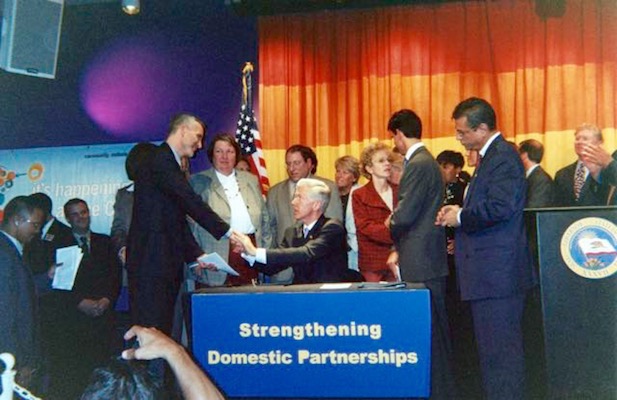
Eric Bauman (on right) at event where Gov. Gray Davis (seated) signed domestic partnership bill. (Photo by Karen Ocamb)
However, during Bauman’s unexpectedly heated race to become the first openly LGBT CDP chair in May 2017, a number of inaccurate accusations from the Ellis camp emerged. The worst was that he had engaged in “inappropriate behavior with 14- and 16-year-old boys,” an old but painful and effective trope used against LGBT people. “What they’re accusing me of is being a child predator! And I lost it. I started crying uncontrollably,” Bauman told the Los Angeles Blade (May 15, 2017). Then Bauman thought: “how many people are accused of things or are victims of abuse and they hide in shame and so it continues?”
He fumed in an email. “This is despicable! This is not the Democratic Party! These are Trumpian tactics and it has to stop! I’m a pretty tough guy and I can take the attacks, lies, distortions, and mud that has been slung at me pretty well,” Bauman wrote. “But to accuse me of child abuse, especially of this nature, is beyond the pale and 100% unacceptable.”
The Machiavellian rumor was apparently started by a gay Ellis supporter. Ellis denounced the tactic but references to the rumor have shown up in social media responses to the current allegations. It’s hard to un-ring a bell.
Bauman seemed too politically savvy to cross lines of propriety. In Dec. 2011, in an unflattering LA Weekly story calling him the “L.A. Democratic Party Kingmaker,” the author describes Bauman’s arm-twisting as “machine politics at its finest.” To which Bauman replied: “I don’t make promises or ask people to do things in a quid pro quo format. That would be against the law. I’m way too high-profile, way too visible a guy to do that.”
The Los Angeles Blade spoke with numerous gay and straight politicos familiar with Bauman and his decades-long leadership in the Democratic Party. They requested anonymity for fear of being dragged into a controversy that might sully their own name or out of respect for the due-process investigation or not wanting to appear to attack the alleged victims.
Two gay men independently said that years ago Bauman said hello with a lingering pat or quick grab of the butt at an event—but neither man considered the touch sexual harassment. They said Bauman never followed up with anything physical or with sexually explicit comments. Several people said they saw him drink but never saw him drunk. Others said he was often flirtatious, would give an unexpected shoulder rub and sometimes made lewd jokes and risqué gestures that made some people uncomfortable—but never to the degree that he should be reported for sexual harassment. No one ever experienced or witnessed him commit the crime of sexual assault such as grabbing or groping.
But there were notes of hesitation, too. “I don’t believe any of it,” one politico told the Los Angeles Blade. “Except Larimore-Hall is too smart to use the term ‘sexual assault’ unless he had something behind it.”
“I take seriously any allegation brought forward by anyone who believes they have been caused pain,” Bauman said in a statement that did not include an abject denial. He announced the independent investigation “ensuring these individuals making the charges are treated with respect and free from any concerns of retaliation.” He added that he looks “forward to putting these allegations behind us and moving forward as unified Democrats.” Alex Gallardo-Rooker, another party vice chair, is serving as acting chairwoman during the investigation.
The story grabbed national headlines but seemed to disappear as other splashier news moved center stage. And then came the Nov. 28 bombshell, with The Times interviews of 10 party staffers and political activists who claimed Bauman “made crude sexual comments and engaged in unwanted touching or physical intimidation in professional settings.”
“People just didn’t know how to speak up about it,” Allan Acevedo, an activist with California Young Democrats told The Times. “There was a sense of loyalty. Not just to him, but to any advancement that any LGBT person makes in terms of us having representation at the table.”
“Eight current party staffers said that, while he was serving as chairman, Bauman would regularly make sexually explicit comments in the workplace to men and women, including remarks about sexual acts, his and other staffers’ genitalia, and being sexually attracted to staff members,” The Times reported, citing some accusers by name. “The eight staff members each said they also experienced or witnessed Bauman engaging in unwanted touching, particularly directed toward male staffers.”
The California Democratic Party’s handbook defines prohibited behavior, including sexual harassment and assault, and prohibits the use of alcohol while at work. On Nov. 28, Bauman, 59, said he’s going to rehab.
”I deeply regret if my behavior has caused pain to any of the outstanding individuals with whom I’ve had the privilege to work. I appreciate the courage it took for these individuals to come forward to tell their stories,” Bauman said in a statement. “In the interest of allowing the CDP’s independent investigation to move forward, I do not wish to respond to any of the specific allegations. However, I will use the time I am on leave to immediately seek medical intervention to address serious, ongoing health issues and to begin treatment for what I now realize is an issue with alcohol.”
What will the investigation determine? Was this a behind-the-scenes political coup by progressive purists who want to rid the CDP of the old guard? Are the allegations asserted by a new generation with internalized homophobia? Or might Bauman have been blind to his own bad behavior? In any event, there has been a coup—an overthrowing of the old gay cultural attitudes of physical and verbal coziness, which is unacceptable in today’s professional environment.
“Leading the California Democratic Party to historic victories has been the honor of a lifetime, and I look forward to continuing this important work upon the conclusion of the investigation and when my health allows,” Bauman said in his statement.
Los Angeles
Stonewall Young Democrats bounces back from “quiet year” with Hero Awards

On Saturday, Feb. 7, the Stonewall Young Democrats (SYD), an organization that mobilizes and fosters community for young, LGBTQ+ people, hosted its “Hero Awards” ceremony at Beaches West Hollywood. Under luminous pink light, vibrant crowds of community members showed up to support and celebrate people and organizations spearheading LGBTQ+ visibility, change, and livelihood across L.A. County. Political figures filled the venue wall to wall, including LA Mayor Karen Bass, West Hollywood Mayor John Heilman, West Hollywood Council Member John Erickson, and California Assemblymember Rick Zbur.

Several local advocates and politicians were honored for their queer advocacy and leadership, including City of Los Angeles LGBTQ+ community affairs liaison Carla Ibarra, L.A. Democratic Party Chair Mark Ramos, Congressman Mark Takano, and L.A. County LGBTQ Commission Chair Sydney Rogers. The Los Angeles Blade was also recognized with an Impact Award.
Los Angeles Blade publisher Alexander Rodriguez accepted the award. In his acceptance speech, Rodriguez shared, “We report on and share the struggles of our queer community. We also get to see the resilience and strength our community has, even in the face of adversity. We see firsthand the importance of the Stonewall Young Democrats and the amazing network of people they have put together, as seen here today.”

The Stonewall Young Democrats formed in 2004, immortalizing the 1969 Stonewall riots in its name. The decision to carry the legacies of early gay rights movements is poignant: queer resistance and their enduring battle against political and social marginalization and violence are seared into the organization’s core.
SYD’s President Kanin Pruter is keeping this link to the past alive; it’s a reminder of the interconnectedness of the queer community. “Our history is there for a reason,” Pruter told the Blade. “Without lesbians during the AIDS crisis, we would not be where we are today. And our movement was started by Black trans women.”
This recent Hero Awards marks SYD’s revitalization. After a relatively quiet year, its board is excited to grow its organization, recruit diverse and eager LGBTQ+ folks, and create fruitful opportunities for everyone in the organization to develop their political advocacy and organizing skills.

Most importantly, Pruter hopes that SYD can be a safe, inclusive, and accessible space for any LGBTQ+ person who has felt outcast before. “In a loving and joking way, we’re an island of misfit toys,” Pruter said, who is intentional about creating environments where queer folks who have experienced trauma, isolation, and exclusionary social politics can fit in and belong.
“I want folks to be open, vulnerable and leave any preconceived notions at the door. We come in here [and] we are who we are. We respect each other’s identity, and we’re here to foster a culture where everyone feels welcome.”
Pruter encourages young LGBTQ+ people who are interested in getting involved in SYD, to contact him and learn more about the organization. More information can be found here.
Kristie Song is a California Local News Fellow placed with the Los Angeles Blade. The California Local News Fellowship is a state-funded initiative to support and strengthen local news reporting. Learn more about it at fellowships.journalism.berkeley.edu/cafellows.
AIDS and HIV
Congresswoman Maxine Waters introduces new resolution for National Black HIV/AIDS Awareness Day
H.Res.1039 supports more funding, resources and awareness for Black American communities, who are disproportionately impacted by HIV/AIDS.

Today is National Black HIV/AIDS Awareness Day. Advocates established this day of awareness on Feb. 7, 1999, and nearly 30 years later, Black communities in the U.S. continue to be disproportionately impacted by HIV.
On Wednesday, California Congresswoman Maxine Waters introduced H.Res.1039, a resolution that supports the goals of National Black HIV/AIDS Awareness Day and calls for a collective commitment to address disparities Black people with HIV face. Waters represents the state’s 43rd congressional district, a majority Black and Brown population comprising South L.A. cities like Hawthorne, Gardena, and Inglewood.
In the resolution, Waters urges state and local government officials, as well as their public health agencies, to acknowledge the importance of this awareness day and encourage their constituents to get tested for HIV. The resolution also requests that the Secretary of Health and Human Services prioritize distributing grant funding to minority-led, HIV organizations and community-based approaches to fighting HIV stigma, LGBTQ+ discrimination, and racism.
In 2023, young Black men accounted for 47% of new HIV diagnoses among youth, while young white men made up 3% of these diagnoses, according to a new Williams Institute report. Black women also have the highest HIV diagnosis rate among women, and Black community members overall represent 38% of new HIV diagnoses and 39% of people living with HIV in the U.S., despite being only 12% of the national population.
Beyond the disproportionate rates of infection and diagnosis amongst Black Americans, these communities also face greater difficulties in accessing the medical care needed to prevent and treat HIV. In the same year, white Americans were 7 times more likely to access Pre-exposure Prophylaxis (PrEP) compared to Black Americans, a data point that affirms racial and healthcare inequities Black people continue to face in the U.S.
“[This] is a day to commemorate the impact of HIV/AIDS on Black Americans and encourage continued efforts to reduce the incidence of HIV, eliminate health disparities, improve access to care and treatment, and show support for all those who are living with HIV/AIDS,” said Congresswoman Waters, in a press release.
Waters has been an advocate for people impacted by HIV/AIDS since the peak of the crisis in the 1980’s. In 1998, she worked to establish the Minority AIDS Initiative, which expanded national prevention and treatment efforts in support of minority communities, who remain disproportionately impacted by HIV. In 2025, Waters introduced the “HIV Prevention Now Act” as well as the “PrEP and PEP are Prevention Act,” to increase prevention efforts and reduce health insurance barriers to access preventative resources, respectively.
H.Res.1039 is the latest addition to the congresswoman’s efforts to raise awareness for Black and other minority communities impacted by HIV/AIDS, and to fund and support on-the-ground efforts that prioritize their care and wellbeing.
The resolution is endorsed by various LGBTQ+ organizations mobilizing for communities impacted by HIV, including AMAAD Institute (Arming Minorities Against Addiction and Disease), LA Pride, AIDS Foundation Chicago, and PFLAG National. The resolution is also co-sponsored by 29 other U.S. representatives, including fellow California congressmembers Robert Garcia, Laura Friedman, Nanette Barragán, Sydney Kamlager-Dove, Lateefah Simon and Mark Takano.
H.Res. 1039 has been referred to the House Committee on Energy and Commerce, and currently awaits further action.
Kristie Song is a California Local News Fellow placed with the Los Angeles Blade. The California Local News Fellowship is a state-funded initiative to support and strengthen local news reporting. Learn more about it at fellowships.journalism.berkeley.edu/cafellows.
Los Angeles
Project Angel Food is now able to feed 10,000 people daily with expanded building
On Thursday, community gathered to celebrate Project Angel Food’s new kitchen and campus building, which allows them to serve more of the county’s critically ill community.
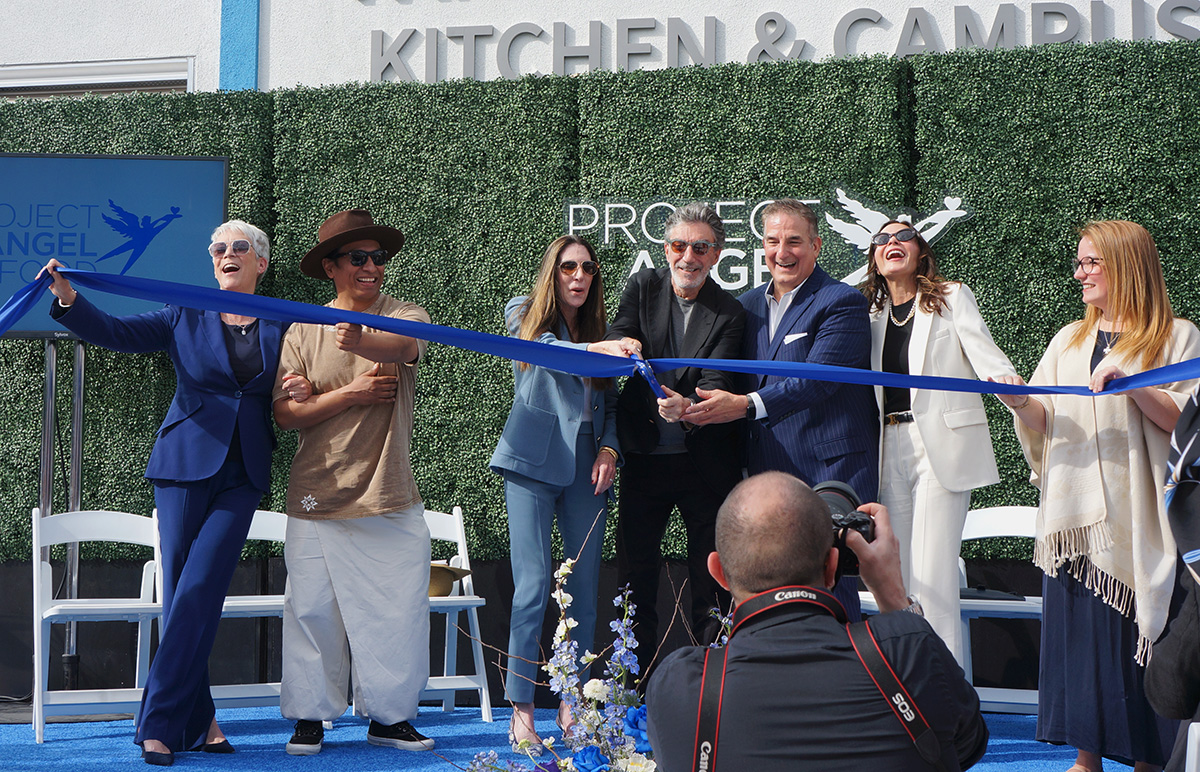
On Feb. 5, community members gathered at 922 Vine Street to celebrate the expansion of Hollywood-based non-profit Project Angel Food. That Thursday morning, the organization cut the ribbon for its Chuck Lorre Family Foundation Kitchen and Campus: one of two new buildings that greatly increase its capacity to provide healthy food and nutritional resources to the county’s critically ill community members.

Project Angel Food was founded in 1989 by author and activist Marianne Williamson and blossomed from a dire need to feed people impacted by HIV/AIDS during the epidemic. Today, the organization cooks and delivers over 1.5 million meals, tailored to specific needs that include chronic illnesses and gastrointestinal issues, to 5,000 people across Los Angeles.
In August 2023, the organization launched its “Rise to the Challenge” campaign, a multi-year expansion and renovation project backed by $51 million. Now, its first phase is complete, and its impact is expected to double.
With the new Chuck Lorre Family Foundation Kitchen and Campus, Project Angel Food’s kitchen staff — which, like the rest of the organization, is majorly powered by volunteers — has access to 16,000 square feet of expanded space, which includes more ovens, walk-in freezers, and hot cook lines than they’ve ever had access to previously. Project Angel Food CEO Richard Ayoub explained today that this will allow staff and volunteers to serve 10,000 people a day.
The organization’s executive chef, John Gordon, explained to the Blade that “space issues” were a major hindrance previously. Before the new kitchen was opened, staff worked out of a much smaller Lincoln Heights facility. “If you didn’t get the rack, you don’t have the sheet pans. If you got the sheet pans, you don’t have the last chiller,” Gordon said, explaining how difficult it was before to balance multiple tasks in the same space. Now, their team of seven chefs, 12 kitchen assistants, dishwashers, and volunteers can work in several cook lines at the same time.
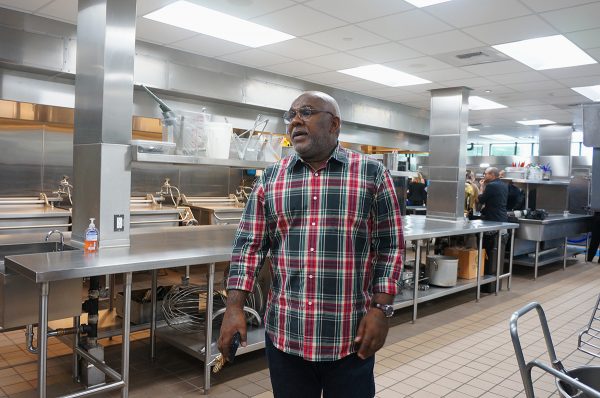
“We’re much more efficient this way,” Gordon continued. In the kitchen, the day begins at 8 a.m. Someone will pick music for the morning, setting a groove for staff as they sync up to review recipes, pack meals prepared from the day before, and cook meals for the next day ahead. After a lunch break, they continue to work until 4 p.m. to make sure they’re meeting the needs of the community they serve.
For locals like Celeste, a Project Angel Food client who is affected by multiple sclerosis, this service is crucial. On days the disability “really takes effect,” being able to receive nutritious meals customized to her needs makes a meaningful difference. “Some days, I’m not able to get up,” Celeste said. “Just that one meal [can] give me an extra boost [and] allow that sun to shine brightly even on my rainy days.”
For advocates and Project Angel Food supporters, Thursday’s celebration was also an act of resistance and a bold declaration against the federal administration. Jamie Lee Curtis, the honorary co-chair of the “Rise to the Challenge” campaign, spoke of the “love” that lay at the core of Project Angel Food’s foundation: a kind of love she finds completely absent in the federal administration.
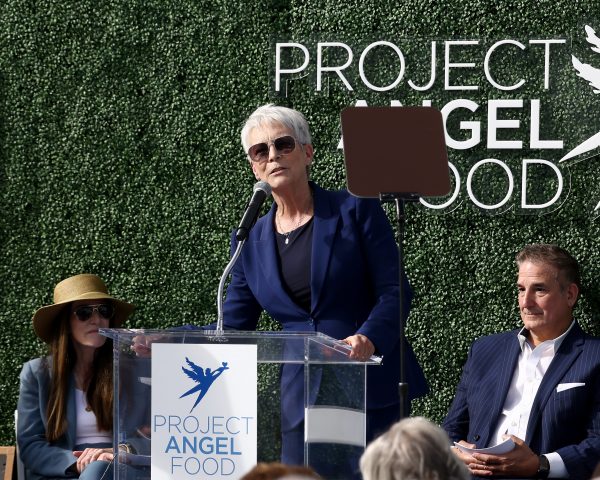
“We are a community here today the same way they are in Minnesota, and I feel like what they’re doing is what we’re doing,” Curtis said to the crowd, defiance firm in her voice. “And we’re only going to get any shit done if we do it together and defy these motherfuckers.”
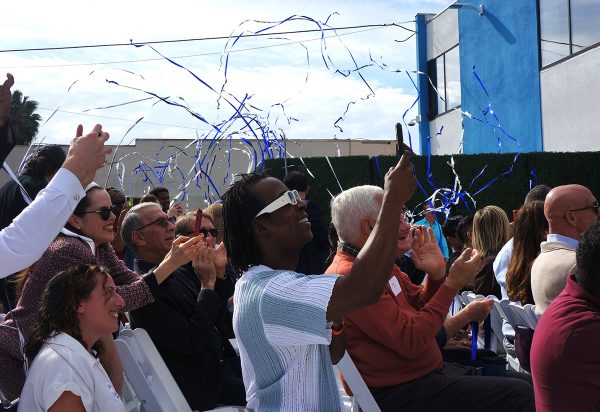
County supervisor Lindsey Horvath, a former delivery volunteer at Project Angel Food, affirmed this statement and guaranteed the county’s continued support in the organization. Horvath spoke of the government’s “glaring absence” during the HIV/AIDS epidemic: one that is “eerily similar” to its attitude now.
As the government mobilizes Immigration and Customs Enforcement (ICE) agents, sending immigrant communities spiraling into crisis, on-the-ground organizations like Project Angel Food are standing in firm support of their marginalized and ill community members. Horvath’s confirmation of county support is also rooted in this mission.
The building’s exterior also reflects the organization’s dedication to its residents. On the south side, a new large-scale mural painted by esteemed local muralist Robert Vargas highlights the stories of local volunteers and vendors who live and work in the neighborhood. Vargas explained that seeing these people in action “crystallized” the dedicated service and harmony that exists among the organization’s volunteers, clients, staff, and nearby community members.
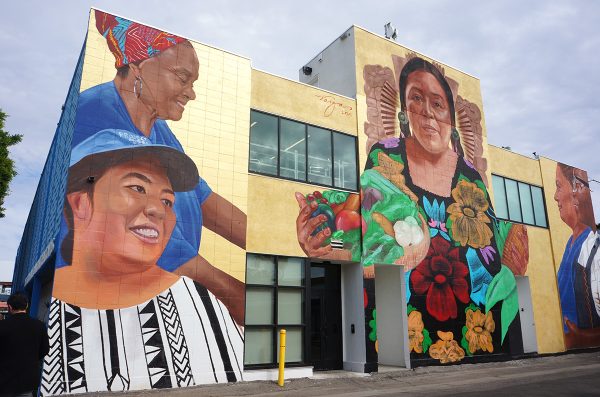
Next, the second building of the Chuck Lorre Family Foundation Kitchen and Campus begins construction this summer. This space will house the organization’s nutrition, volunteer, and client services and will also include its first department dedicated to research and policy. There will also be a training kitchen, where clients will be able to learn how to cook meals on their own.
As Project Angel Food’s growth continues, Ayoub hopes community members who are able to pitch in will do so. While public funding can feel unsteady, he explained, community strength and sustainment can fill those gaps of doubt. The organization is $2.3 million away from its goal in securing capital for this second building, and Lorre will match donations up to $1.5 million.
Kristie Song is a California Local News Fellow placed with the Los Angeles Blade. The California Local News Fellowship is a state-funded initiative to support and strengthen local news reporting. Learn more about it at fellowships.journalism.berkeley.edu/cafellows.
Arts & Entertainment
2026 Best of LGBTQ LA Readers’ Choice Award Nominations
Nominations for the Best of LGBTQ LA Awards are open from until February 15th!

It’s time to celebrate the vibrant and diverse LGBTQ+ community of Los Angeles! Nominations for the Best of LGBTQ LA Awards are open from until February 15th, giving you the chance to highlight your favorite local legends, hotspots, performers, and change-makers. Then, from February 23rd to March 6th, cast your vote for the finalists and help decide who truly represents the best of LGBTQ LA. The Best of LGBTQ LA Awards Party will be held on March 26th at The Abbey!
Use the form below or click the link HERE to nominate!
Los Angeles
Community members urge city council to invest in trans lives
Advocates introduced the TGI Wellness and Equity Initiative, a campaign that would direct crucial funding to trans, gender expansive and intersex community organizations.
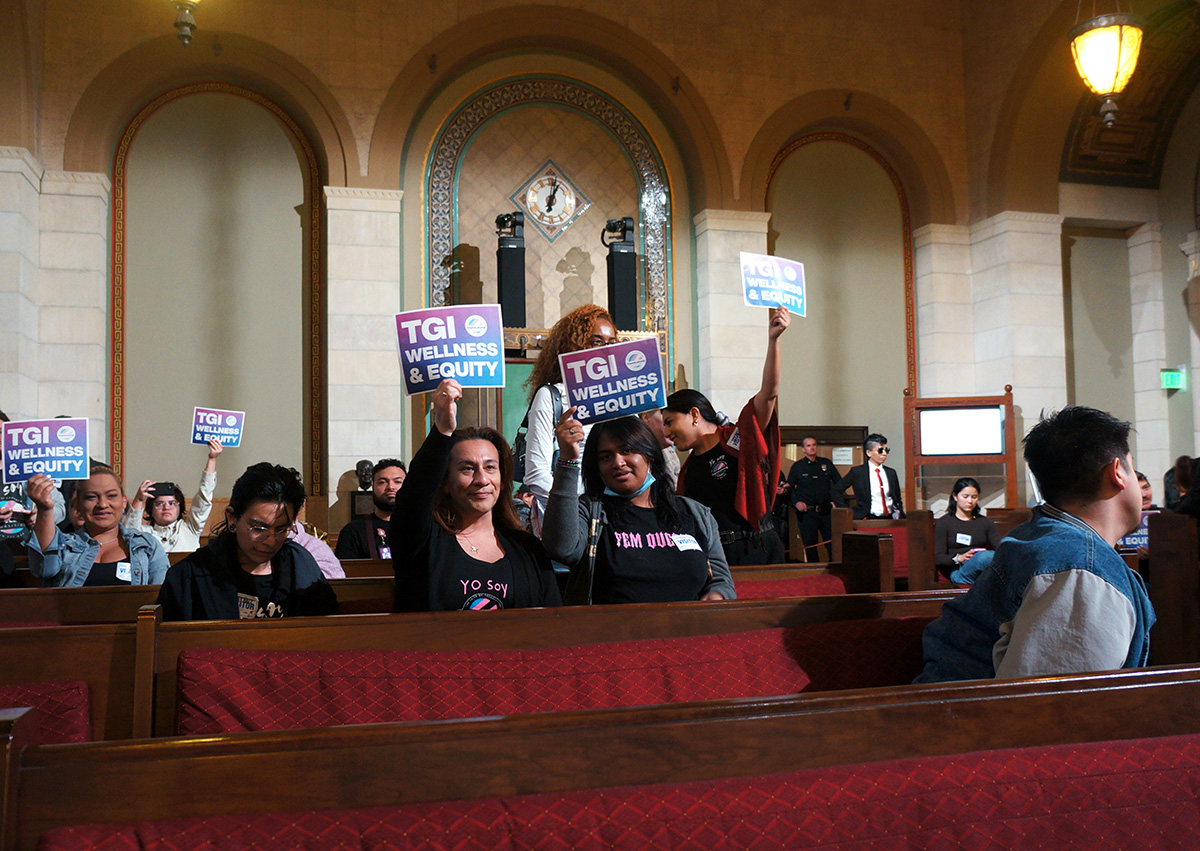
At 9 a.m. on Tuesday, ahead of L.A.’s regular city council meeting, a long procession of people wrapped around the entrance leading into the council chamber. Someone remarked that it was “unprecedented” to see so many people gathered, waiting to get inside. Several housing advocates and legal experts were waiting to make public comments about Measure ULA, otherwise known as the county’s “mansion tax.”
Another fifty or so transgender, gender expansive and intersex (TGI) advocates from the TransLatin@ Coalition (TLC), a long-standing organization that provides housing and meal support, legal services, mental health guidance and peer support groups, showed up to demand real, tangible support on behalf of themselves and their community members as the Mayor prepares the city’s budget on how funds will be allocated.
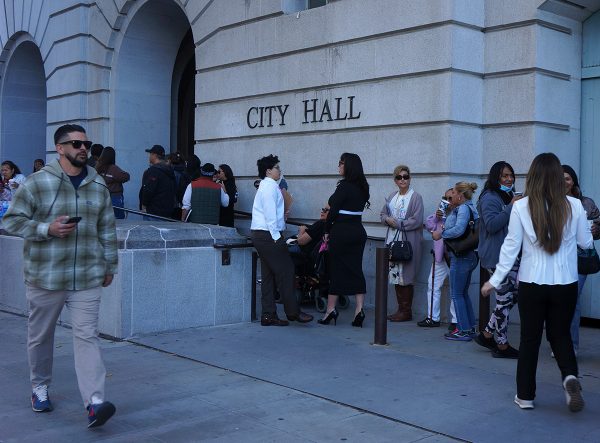
TLC advocates called on the city council to invest in their TGI Wellness and Equity Initiative (TGI WE), a two-year pilot program that would provide $4 million to five organizations that support the safety and rights of local TGI people. This money would expand each organization’s ability to hire more staff and expand their outreach, resources, and ability to serve a continually underserved community: TGI Angelenos who are multiply marginalized as violence against trans people and immigrants continues to increase.
During public comment, TLC president and CEO Bamby Salcedo requested that the council move forward with the initiative. Aside from general support, she asked that two council members act as co-sponsors and petitioners for the initiative. This way, TGI WE can be added as an official agenda item for future city council meetings, which would get the ball rolling for the initiative’s funding goals.
“Right now is the time to stand in solidarity with our community and stand against the federal government, who is attacking and trying to disappear trans people,” Salcedo told council members. Several other advocates, including TLC policy ambassador ChiChi Navarro, Christopher Street West board member NiK Kacy and Invisible Men director Jovan Wolf delivered passionate statements in support of TGI WE.
“Los Angeles is in a state of crisis, and our communities are running out of time,” Navarro told the council. They also spoke to the county’s growing investment in LAPD, while TGI organizations receive nothing. “This is not a resource shortage. It is a resource allocation choice [that] is costing lives. We need this council to introduce the TGI Wellness and Equity initiative immediately…We cannot wait. We need urgent investment today.”
TGI WE would fund community-run organizations that focus on individualized care that is facilitated with language support and sensitivity training, a kind of care that is crucial for TGI community members who often face criminalization and discrimination at the hands of law enforcement agents.
“We are their lifeline, and we demand your support,” Jovan echoed. “It’s time for the city of L.A. to make good on its promises to be for everyone…You and all of us know that we have been marginalized, pushed to the sidelines, and we continue to be an afterthought in your budgets and your agendas.”
When the meeting concluded, TLC members rallied together for a demonstration, calling out: “Support trans lives!” as council members filed out of the chambers.
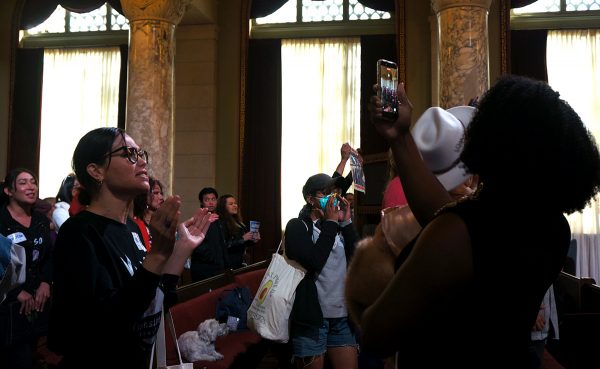
On the quiet walk back onto the street outside, Navarro reflected on the importance of this meeting and the effort community members made to be there. “A lot of the time, not just city council, [but] groups in general tend to forget trans people,” Navarro told the Blade. “Trans people are here. You saw today: clearly, we’re not a small pocket. I think we have to show them: we’re here [and] we’re not going anywhere.”
“It’s not great to be left in a place where you’re expected to continue to do the work, but without any actual support,” Navarro continued. Besides concrete funding, official citywide support for TGI WE would affirm that elected officials are willing to take a stance and take meaningful action when it comes to supporting TGI community members. “So it’s not just the money,” Navarro said. “L.A. has a motto, [that] L.A.’s for everyone. But I don’t know how you can say that when you’re not doing everything in your capacity to protect everyone.”
Kristie Song is a California Local News Fellow placed with the Los Angeles Blade. The California Local News Fellowship is a state-funded initiative to support and strengthen local news reporting. Learn more about it at fellowships.journalism.berkeley.edu/cafellows.
Los Angeles
UCLA’s long-standing LGBTQ+ alumni organization welcomes new president
The Blade sat down with paralegal studies professor and local advocate Bobby Rimas to talk about intersectional leadership and his goals for the UCLA Lambda Alumni Association.

As a young student studying history at UCLA, Bobby Rimas was grounded by his growing desire to give back to his community. He worked as a tutor for low-income students and became invested in learning about the ways intersectionality impacts people’s access to education and resources. “My barriers may not be the same as yours, and your barriers may not be the same as mine,” Rimas told the Blade. “How do you apply that in leadership [and] in the classroom?”
After 15 years of service to UCLA’s various alumni networks, first beginning with the Pilipino Alumni Association, Rimas became president of the university’s Lambda Alumni Association on Jan. 1. The UCLA Lambda Alumni Association was formed in 1989 as a way to support LGBTQ+ students and graduates with professional development, scholarship opportunities, mentorship, and other outreach support.
UCLA has long been a local epicenter of queer activism and advancement. Students formed groups like the Gay Student Union and Lesbian Sisterhood in 1969 and 1973, respectively, to empower and connect queer students. Queer art and culture also thrived in this time, as students saw the launches of the queer campus paper, magazine, and a film festival that centered on LGBTQ+ stories.
Administratively, campus officials were taking a stance against LGBTQ+ discrimination. In 1975, UCLA Chancellor Charles E. Young banned departments and programs from discriminating on the basis of sexual orientation.
In the decades since, leaders like Rimas are working to preserve this history and also build upon it. How can we inspire students in and out of the classroom? How do we make sure they have access to valuable resources and can advocate for themselves in places that are not always inclusive of their needs and identities?
Rimas often ponders these questions, both as president of the Lambda Alumni Association and at Cal State LA, where he works as an associate professor of paralegal studies. There is often cross-pollination in the concerns he receives from alumni members as well as his students: How do they find employers who are accepting of LGBTQ+ people? How do they avoid being discriminated against in the workplace?
These are questions Rimas hopes to tackle more in his role as president of the UCLA Lambda Alumni Association and in his continued tenure as an educator. One of his first goals is to expand the board and bring on more diverse perspectives to the organization. “More people means more activity,” Rimas said, who hopes that the combined knowledge and resources of the board can better serve students and alumni.
Rimas also hopes to throw a large Gala event, one that mirrors the extravagant, celebratory 2019 bash he organized for the association when he was first brought onto the team. 100 people attended, creating a wave of awareness for the organization and increasing their scholarship funding.
What’s next? UCLA Lambda Alumni Association’s first board meeting is this upcoming Monday. Rimas hopes to discuss strategies to grow the organization’s presence beyond the campus’ reach, in other queer cornerstones like West Hollywood, elevating diverse LGBTQ+ voices, and improving ways they can professionally support their network’s members.
Kristie Song is a California Local News Fellow placed with the Los Angeles Blade. The California Local News Fellowship is a state-funded initiative to support and strengthen local news reporting. Learn more about it at fellowships.journalism.berkeley.edu/cafellows.
Los Angeles
South L.A. celebrated Black joy and resistance at yesterday’s Martin Luther King Jr. Day Parade
The Blade also sat with staff from Center South, a community site that champions the safety and health of South L.A.’s LGBTQ+ communities of color.
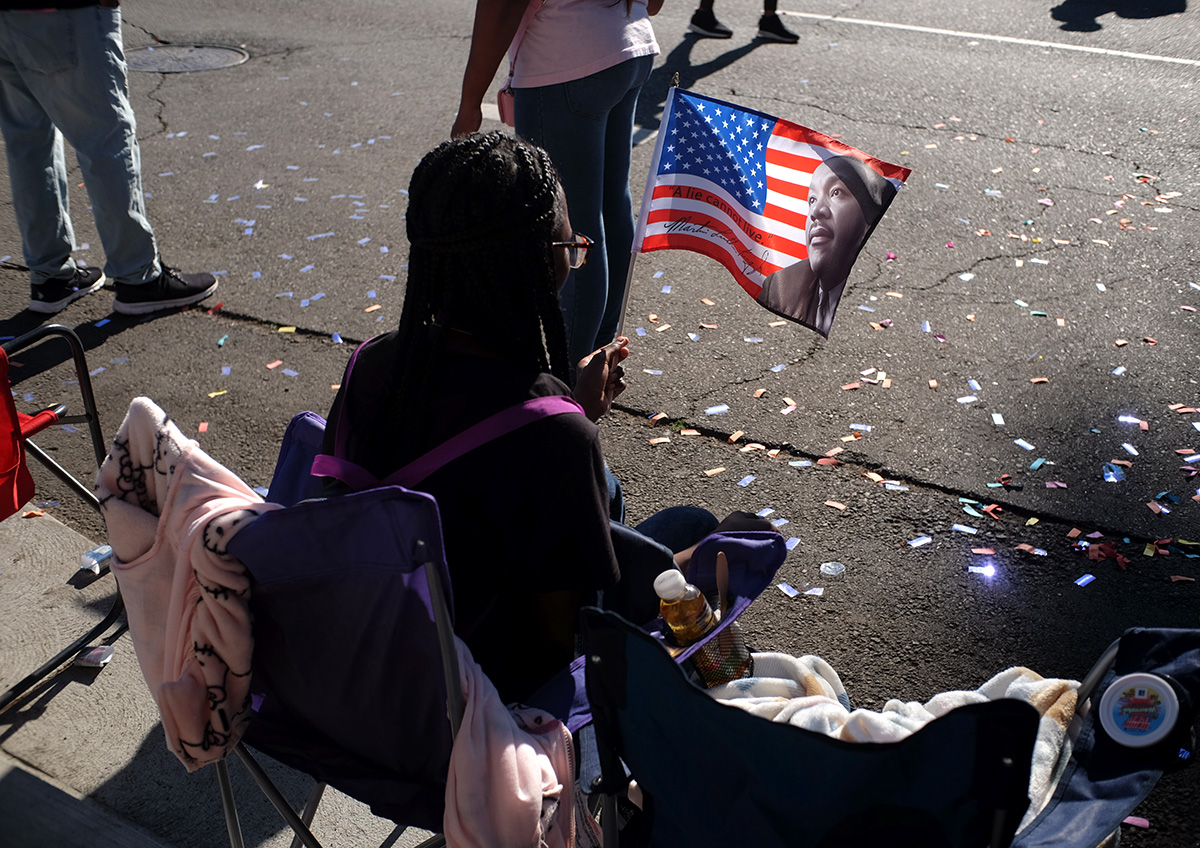
At 9 a.m. on Monday, Jan. 19, South L.A. community members gathered on the streets, holding onto lawn chairs and the hands of their children and family members. “Good morning,” one greeted. “Are you ready for the parade?” Neighbors laughed and hugged underneath the warm morning sun, staring into the horizon in anticipation of the county’s official Martin Luther King Jr. Day Parade, organized by Bakewell Media and the Los Angeles Sentinel Newspaper.
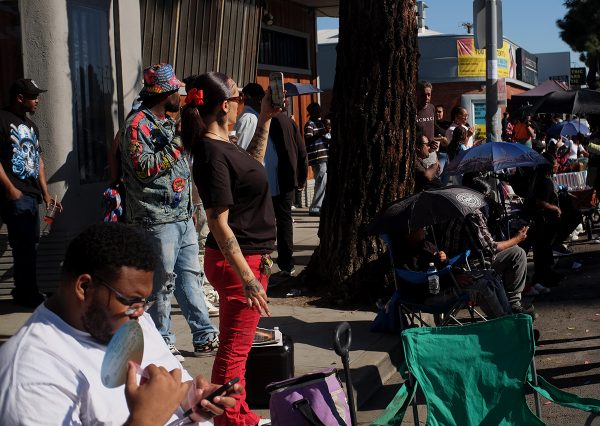
When the parade began an hour later, organizations like labor union SEIU Local 721, civil rights group Black Lives Matter Los Angeles, and HIV care and advocacy nonprofit AIDS Healthcare Foundation marched to cheers and waves from the crowd. Young musicians, drill and cheer teams from Marcus Garvey School and other schools stepped in unison, performing elaborate routines and sending jolting, infectious waves of drum and trumpet like electricity through paradegoers.
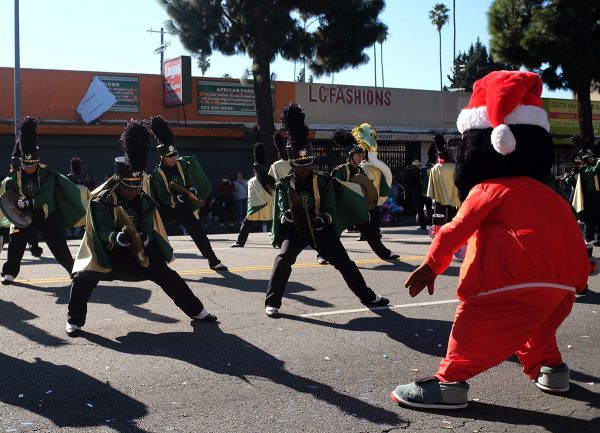
Black liberty and joy coalesced with a call to face injustice at yesterday’s festivities. Black Lives Matter Los Angeles members handed out flyers demanding accountability for Keith Porter, who was killed by an off-duty Immigration and Customs Enforcement (ICE) agent on Dec. 31. Marchers also waved the Iranian flag in solidarity with its people, who have faced increasing state-sanctioned violence after they began protesting the government in the midst of an economic downfall.
Communal care and empowerment remain, for many, the only way forward as trust in broader governmental systems and structures wanes. While celebrating the monumental work of the late civil rights activist, community members yesterday echoed an important, resonant message: The work is not yet done.
This community work is largely supported by local advocates and organizations like Center South: one of the Los Angeles LGBT Center’s community sites. Yesterday morning, ahead of the parade, senior program manager Steven Campa and fellow staff members welcomed people into the space for coffee and pastries.
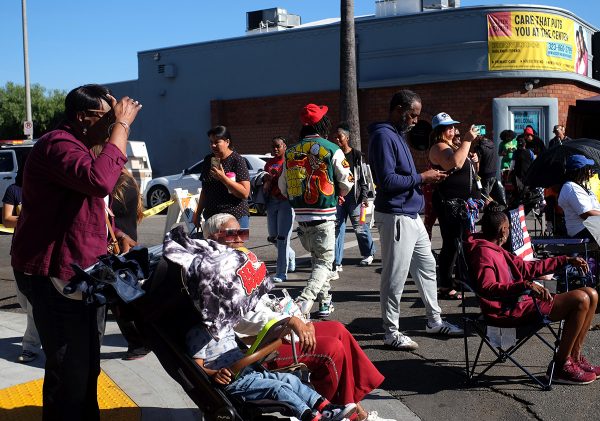
They also handed out flyers introducing residents to the site’s resources, which include: hygiene kits, HIV testing, a free monthly farmers market and clothing closet, mental health and primary care services, substance use and recovery programs, as well as social groups that prioritize LGBTQ+ people of color living in the neighborhood.
Center South opened six years ago, reclaiming a space that once housed a vibrant jazz supper club. At first, the site focused on providing services specifically for men who have sex with men (MSM), regardless of whether or not they identified as a member of the LGBTQ+ community. Over time, Center South became more inclusive of and responsive to the local community as a whole, becoming a safe space for anyone in South L.A. seeking refuge and care.
Campa, who has been with Center South since its founding, emphasized the constantly-evolving nature of the place as it molds itself to best serve and represent its community. Staff members and clinicians are nurtured by their own personal connections to the neighborhood, yearning to give back to the place that raised them.
And that has an effect. “How does it look to have a provider who’s queer: a provider that looks like folks in the community?” Campa said. “We’re our community. Folks grew up [here]…To speak to the MLK Day parade, this was a holiday for the Center. Folks chose to be here. Understanding that we are on MLK Boulevard, we want to continue to do [show up] every year to provide a safe space for the community.”
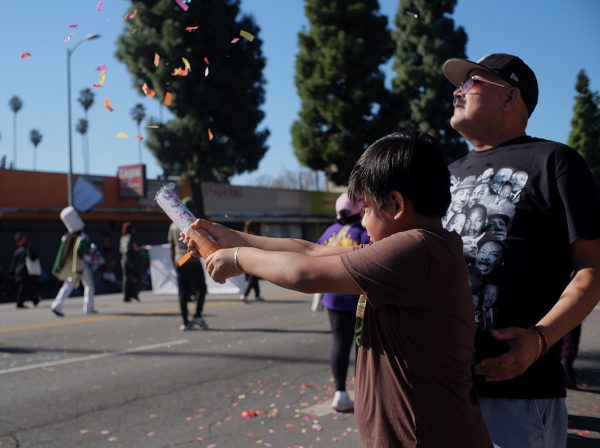
Campa, his staff members, and fellow Los Angeles LGBT Center staff want to expand what it means to be safe and healthy — and to see that reflected more broadly in their communities. “A healthy person needs medical care [and more],” said the Center’s chief equity officer, Giovanna Fischer, who showed up on Monday to celebrate the parade with the community. “[They also] need food access, immigration support…That’s definitely going to impact their health and wellbeing,” Fischer told the Blade. “
Campa, Fischer, and other advocates are strategizing for their community in uncertain times, as threats to instrumental funding are seemingly always on the table. But as they “forecast for the future” and continue to build a collective vision that uplifts LGBTQ+ people of color, their fight endures. “We deserve to think about where we want to go,” Fischer said. “We deserve the opportunity to dream and scheme, and so does our community. So until further notice, we’re going to continue to do that.”
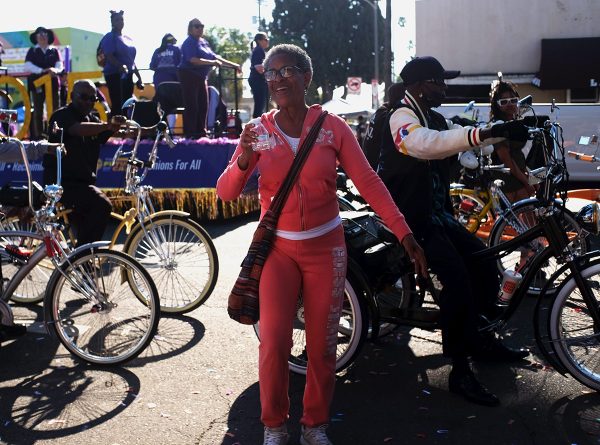
Kristie Song is a California Local News Fellow placed with the Los Angeles Blade. The California Local News Fellowship is a state-funded initiative to support and strengthen local news reporting. Learn more about it at fellowships.journalism.berkeley.edu/cafellows.
Los Angeles
Advocates demand that trans youth be protected as cases are argued in Supreme Court
This week, LGBTQ+ advocates and legal experts spoke in support of trans youth as two Supreme Court cases challenge their rights and safety.

This Tuesday, the Supreme Court heard oral arguments regarding two cases about transgender girls in sports: Little v. Hecox and West Virginia v. B.P.J.
In 2020, Idaho Governor Brad Little signed into law HB 500, which bans transgender girls and women from participating in school sports. This affected the first case’s respondent: transgender student athlete Lindsay Hecox, who was barred from participating in the track and cross country teams as well as intramural soccer and running clubs.
In 2021, then-governor of West Virginia, Jim Justice, approved HB 3293, which enacts a similar ban. Becky Pepper-Jackson (B.P.J.), now an incoming high school student, opposed the discriminatory policy when it prevented her from joining her then-middle school’s cross country and track and field teams. Pepper-Jackson has also only undergone female puberty due to gender-affirming care, but West Virginia argues that its anti-transgender policies should be upheld because of her assigned sex at birth.
For LGBTQ+ advocates and allies, these cases illustrate the burden and harm transgender people face daily as their rights to privacy, dignity, care, and inclusion are constantly at risk of being eroded and stripped completely.
Experts also wonder if these cases could potentially reshape the Constitution’s Equal Protection Clause as well as the civil rights law, Title IX. The former prohibits discrimination on other factors aside from race, though governments have argued that certain “suspect classifications” can be looked at more closely through “heightened scrutiny.” The latter prohibits sex-based discrimination in federally-funded schools.
What is unfolding and how local advocates are informing change:
The fight ahead is weary, and experts are certain that the states involved will not concede their points. In a webinar organized yesterday by the Williams Institute, several LGBTQ+ policy experts, including Rutgers Law School professor and anti-discrimination scholar Katie Eyer, examined where these cases may be heading, as well as efforts to muddy the arguments.
“It seems possible that the court might try to sidestep that issue here by saying that these laws don’t target transgender people at all,” Eyer said. “I think for most people, this seems bananas: like an upside-down world. We all know these laws were about transgender people.”
Jenny Pizer, an attorney for the LGBTQ+ civil rights legal organization Lambda Legal and a co-counsel member for the B.P.J. case, affirmed this sentiment at a press conference organized Tuesday by Lambda Legal and AIDS Healthcare Foundation affinity group, FLUX. “They’ve gone to great lengths to say there’s no discrimination,” Pizer said. “[They’re arguing] it’s just technicalities or classifications.”
Eyer was one of three Equal Protections scholars who filed an amicus brief to be considered in the Supreme Court cases. An amicus brief is a legal document submitted by someone who is not involved directly in a case but who may offer additional perspectives and information that can inform the ruling process.
Eyer’s brief provided historical context that clarified the disadvantages of blanket sex-based policies. These types of laws, according to Eyer, uphold stereotypes over nuance, truth, and equal protection guidelines. For Pepper-Jackson, who has only undergone female puberty and who does not “benefit” from what dissidents define as a sex-based competitive “advantage,” the state should have provided her the ability to argue that she should have the same rights as other girls.
“Of course, the state hasn’t done that here,” Eyer said. “Under these precedents, the Supreme Court should invalidate the laws as applied to those trans girls who really don’t have a sex-based competitive advantage.”
Who are these bills protecting?
The states argue that their policies are merely “ensuring safety and fairness in girls’ sports.” But queer advocates understand that this is a veneer for the exclusion of transgender people from society. Forcing trans youth out of sports “does not protect anyone,” according to California LGBTQ Health and Human Services Network director Dannie Ceseňa, who spoke at Tuesday’s press conference.
“It encourages the scrutiny of children’s bodies. It fuels gender policing, and it creates hostile school environments — not safer ones,” said Ceseňa. “Our youth should not inherit a world that treats their existence as a threat.”
Transgender people are systemically disempowered
At yesterday’s webinar, Distinguished Visiting Scholar at the Williams Institute Andrew Flores discussed his own amicus brief in support of Pepper-Jackson. The brief highlights the need for “heightened judicial scrutiny” in Pepper-Jackson’s case because the majority of political processes “systemically fail” transgender people.
For example, the transgender community faces substantial barriers in exercising their voter rights because of voter identification laws and other policies that regulate and define identity. “Even being able to gain access to the franchise is a burden for transgender people,” Flores said. “The court does play an important role there. It can grant legitimacy to arguments…or at least [acknowledge] that these issues are more complicated than maybe how they’ll receive them.”
What’s next?
Experts are hesitant about where the cases stand. “Bottom line: I don’t know what the court is going to do in these cases. They may send them back down for further development,” Pizer said, who thinks future rulings will not shift more overarching policies regarding transgender rights. “I think they will probably decide based only on laws about sports, not laws more broadly about the rights of trans folks.”
But whatever is decided, the impacts will trickle down to everyone. While the cases deal specifically with anti-transgender policies, experts warn that LGBTQ+ issues have always been tied to racial, economic, and disability justice. “There’s this looming constitutional campaign to really undermine civil rights,” said Eyer. “That affects LGBTQ people. It affects people of color. It affects people with disabilities. It affects everybody, and it really is concerning.”
As transgender inclusion and safety are being argued on the largest legal stage, advocates are asking: “When are you going to step up?” They are also sending a direct message to transgender youth: “We see you, we believe in you, and we are fighting for you,” said Ceseňa. “You deserve joy, community, and care. You deserve a future that reflects who you are and not who anyone or any politician demands you to be. Trans youth deserve better.”
Kristie Song is a California Local News Fellow placed with the Los Angeles Blade. The California Local News Fellowship is a state-funded initiative to support and strengthen local news reporting. Learn more about it at fellowships.journalism.berkeley.edu/cafellows.
West Hollywood
John Heilman and Danny Hang will serve as WeHo’s new Mayor and Vice Mayor
Last night, community members and local officials gathered to celebrate new leadership and bid a warm farewell to outgoing Mayor Chelsea Byers.
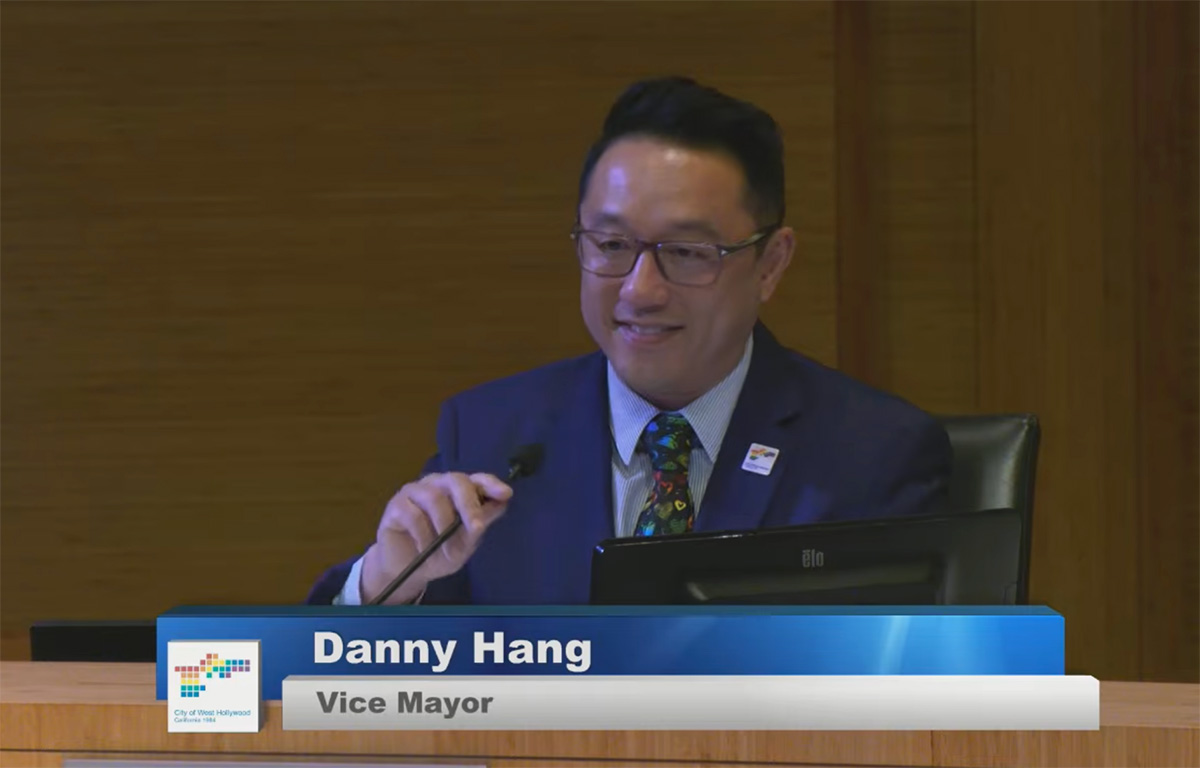
On Jan. 12, West Hollywood residents packed the City’s chambers at 6 p.m. to honor the work of outgoing mayor Chelsea Byers and witness councilmembers John Heilman and Danny Hang take their oath of office as they respectively assume their roles as Mayor and Vice Mayor for 2026.
In her last address as Mayor, Byers spoke about the optimism she holds onto in these unsteady times. To her, West Hollywood is a unique City: one that has become a model for what can be possible in an unjust society. “It’s us against the world. It’s West Hollywood on the stage,” Byers said. “It’s our story to tell, and every single person here contributes in such great ways to that.”
Byers was awarded a plaque on behalf of West Hollywood council members for her outspoken commitment to LGBTQ+ rights, economic justice, housing affordability, and policies that emphasize equity and inclusivity in West Hollywood.
Her leadership remains a bright, guiding light for Mayor Heilman, who was part of West Hollywood’s first city council after the independent city was incorporated in 1984. The spirit of that initial group remains today: queer, progressive, and led for and by the people. Yesterday’s ceremony marked the beginning of Heilman’s ninth time serving as Mayor, as well as his last year on the city council due to term limits.
Now, he leads side-by-side with a self-proclaimed “newcomer,” Danny Hang.
From the 626 to the Westside: Hang’s roots and journey
Hang was born in Monterey Park, a city in the San Gabriel Valley. The region is known for its diverse communities and AAPI-rich culture and history, and Hang recounted to the Blade the deep sense of belonging and comfort he felt growing up there. “I could go to a restaurant, speak Vietnamese or Chinese,” Hang said. “There are people who look like me out there. It is my home away from home.”
After college, he worked at the Social Security Administration, where he helped retirees, disabled people, and those impacted by loss file for Supplemental Security Income (SSI). The work was fulfilling, and he loved feeling that he had a tangible impact on others’ lives: that he could help residents grappling with difficult bureaucratic processes.
This passion grabbed the attention of L.A. County Supervisor Lindsey Horvath, who tapped Hang into serving on West Hollywood’s Disabilities Advisory Board in 2017. Hang eagerly accepted the role, having always been drawn to the vibrant, queer cultural hub. “WeHo was always the land of the unicorn: the land of magic,’ Hang told the Blade. “[This] was a town where I could be open, by myself, and find other people who were also LGBTQ+.”
After serving on the City’s Disabilities Advisory Board and, subsequently, the county’s Business License Commission, Hang noticed a lack of AAPI representation in local leadership. “There aren’t many AAPI people at all in West Hollywood. After I was on the commission, [I thought]: Hey, I think I want to run for city council,” Hang told the Blade.
Creating more inclusive leadership in WeHo
In 2024, Hang was elected to West Hollywood’s city council, becoming the first AAPI councilmember in the City’s 40 year legacy. “I want to see people who look like me in local government, because I want this community to be reflective of the modern-day people who live here. We’re a diverse community, and there’s no reason why we shouldn’t have people of color on the council, as well as more people of color appointed to our boards and commissions.”
Last night, local officials offered encouragement, support, and affirmation to Hang after he took his oath of office. “You’re already making history and certainly making waves across, not just your home region of the San Gabriel Valley, but certainly in California,” said Monterey Park councilmember Henry Lo.
Afterwards, Hang addressed the room, thanking residents, fellow council members and his family. “Standing here as the first AAPI elected to the West Hollywood City Council is deeply meaningful, and I couldn’t have done it without my parents. [They’re] right here in the front row,” Hang said. “My dad was a union worker, who showed me why standing up for workers matters. And my mom worked in a small business, owning a little nail salon in South Pasadena. She taught me what it means to care for others and to keep the community going.”
The year ahead: Heilman calls for residents to unite
Afterwards, Mayor Heilman spoke at length about the upcoming transitional year, the urgency of the current political climate, and ways that community members can step up to support each other. In his last term, he has set his eye on revitalizing the Sunset Strip, stabilizing rent and increasing housing affordability as well as examining the safety of the City’s foundational buildings, including the library and fire station.
He concluded his speech by making an unwavering stance on the “appalling” state of the federal government, stating that every West Hollywood resident must step up together in the face of ongoing federal attacks on the rights of LGBTQ+ people, specifically transgender people, as well as immigrants and other marginalized community members.
“This is a direct attack on our residents. It’s a direct attack on all of us,” Heilman said. “Now is not the time to hide. We need you…Ask what you can do to help people in the community,” he said, galvanizing residents to volunteer for the City’s various social services, nonprofits like Hollywood Food Coalition and Ascencia.
This call for unity and communal bravery echoes Byers’ belief in the courage of the people of West Hollywood. “41 years ago, a group of people defined what government could be,” Byers said. “We’re living the wildest dreams of people decades ago…and we get to be a bridge for that hope for the future. In such a critical moment, it’s truly our responsibility.”
Kristie Song is a California Local News Fellow placed with the Los Angeles Blade. The California Local News Fellowship is a state-funded initiative to support and strengthen local news reporting. Learn more about it at fellowships.journalism.berkeley.edu/cafellows.
Arts & Entertainment
2026 Most Eligible LGBTQ Singles nominations
We are looking for the most eligible LGBTQ singles in Los Angeles

Are you or a friend looking to find a little love in 2026? We are looking for the most eligible LGBTQ singles in Los Angeles. Nominate you or your friends until January 23rd using the form below or by clicking HERE.
Our most eligible singles will be announced online in February.
-

 Bars & Parties3 days ago
Bars & Parties3 days agoSoCal queer singles come together as we celebrate LA’s Top Eligible LGBTQ Singles at the Abbey this Thursday!
-

 Los Angeles5 days ago
Los Angeles5 days agoProject Angel Food is now able to feed 10,000 people daily with expanded building
-
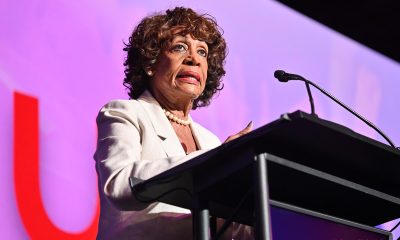
 AIDS and HIV5 days ago
AIDS and HIV5 days agoCongresswoman Maxine Waters introduces new resolution for National Black HIV/AIDS Awareness Day
-
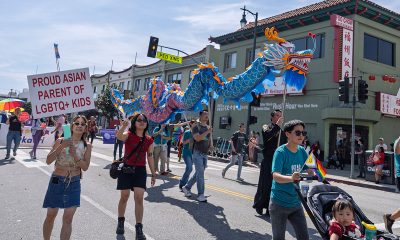
 Features3 days ago
Features3 days agoFrom the Desk of AJSOCAL: How the QTAPI community celebrates Lunar New Year
-

 Commentary4 days ago
Commentary4 days agoAre we done with ‘Drag Race?’
-

 Books4 days ago
Books4 days agoNew book explores homosexuality in ancient cultures
-

 Puerto Rico3 days ago
Puerto Rico3 days agoBad Bunny shares Super Bowl stage with Ricky Martin, Lady Gaga
-

 New York2 days ago
New York2 days agoPride flag removed from Stonewall Monument as Trump targets LGBTQ landmarks
-

 Philippines2 days ago
Philippines2 days agoPhilippines Supreme Court rules same-sex couples can co-own property
-

 Italy3 days ago
Italy3 days agoOlympics Pride House ‘really important for the community’

